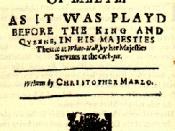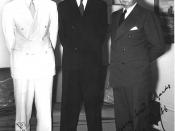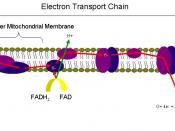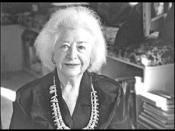I was slightly dismayed to first choose a criticism dated 1957, knowing full well that it would be loaded with words I have never heard of. Again to my dismay, it was. Howard S. Babb begins his criticism by immediately listing for the reader that which all other critics fail to do, in an attempt to make himself seem all the more enlightened.
Babb says on the first page, " What are we to think when the heroic Barabas is suddenly transformed into a plotter? "ÃÂ I must have missed the section where Barabas plays the hero. The best I can assume Mr. Babb is referring to is act one scene two, where Barabas argues with the Christian officials in order to keep his wealth. Barabas certainly did not seem heroic here, although the Christians had no right to simply strip him of his wealth, and Barabas was the only Jew to argue against it, he still did not seem heroic.
In fact, his argument only seems to make him look foolish. Barabas did nothing more then play the victim and whine about what was happening, certainly not the behavior of any hero I am familiar with.
Babb again mentions Barabas being "almost heroic"ÃÂ. This mention is in regards to Barabas counting his money, and using such lines as, "Go tell "ÃÂem the Jew of Malta sent thee, man: /Tush! Who among'st "ÃÂem knows not Barabas?"ÃÂ To call this heroic is absurd. My only impression in this scene was that of Barabas being a very greedy and egotistical man. Since Mr. Babb so enjoys to refer to the dictionary to validate some of his points, I thought I would look up the word heroic in my Websters dictionary. Heroic is defined, " like or characteristic of a hero or his deeds; strong, brave, noble, etc. Of or characterized by men of godlike strength and courage. It seems that of all the words Mr. Babb looked up he did not look up heroic. Getting back to the point, again in this scene, Barabas seems anything but heroic.
Beginning on page two Babb begins to write about the word policy. I understand what Babb is saying by attempting to explain to the reader what is meant by the word. I have also read this section several times. I truly do not see the point in this. Regardless of what the word means, this (at least to me) is no way to criticize or review a play. Babb begins by giving the N.E.D. definition of the word, then goes on to say what the word meant at that time (the 1590's), although I understand what he is saying, again I do not get the point. It seems like another attempt to make himself seem highly enlightened.
On page five of the criticism Babb appears to be saying the opposite of what he said on page two. On page two Babb writes " we are tempted to associate the word [policy] merely with Machiavellianism"ÃÂ, then later on page five Babb writes ""æfilling the league demands a Machiavellian policy towards the Jews. Barabas unveils the fraud in the double puns of the next line: "ÃÂAy, policy! That's their profession,/ And not simplicity as they suggest."àI understand what Babb is saying in regards to a "double pun"àyet it still appears that he has said the opposite of what was previously stated. Regardless of whether this is the case or not, Babb has done a wonderful job of completely confusing me at this point.
Babb also refers to Barabas' revenge against the government, in a Machiavellian fashion. It is incorrect to call this a problem between the government and Barabas. This is a personal matter, and an abuse of governmental powers, but not a case of the government as a whole being unfair. That is what makes this play so interesting. Obviously Barabas wasn't taking revenge against the government, he was taking revenge against Ferneze, making it obvious that he felt Ferneze had wronged him personally. It is not government policy to hate Jews, rather the own personal assumption of some of the Christian rules that Jews are inferior and should be treated as such, thus we have a personal conflict.
Later on page 7 Babb mentions how the play cannot be defined as a "tragedy, or comic, nor tragic-comic."àFrom what I understand from class discussions this play was originally preformed as a comedy. It is possible through performance this play could be a comedy. However, I firmly believe that this play reads as a tragedy and nothing less. However, as with any play, I can understand how it would be interpreted many different ways. When reading The Jew of Malta, I thought it was very horrific and full of lots of hatred and anti-Semitism, far from anything I would ever call a comedy or even humorous for that matter. Babb mentions on page five that the two friars blackmail Barabas by using Abigail's dying confession against Barabas in order to attain his wealth. However it is Barabas who first mentions his wealth in act 4 scene one line 80 saying, " I know I have highly sinn'd. You shall convert me; you shall have all my wealth."àAfter reading this scene several times, I did not see any sign of blackmail. Although I could see how one could easily see that the friars took this perfect opportunity to blackmail Barabas, it was he who first brought up any mention of his wealth. Prior to Barabas brining up his wealth his manservant Ithamore says, "æ"ÃÂpenance will not serve"ÃÂ, here again it sounds like Ithamore is trying to hint that they must give much more then penance. Neither of the friars gave any mention of Barabas' wealth nor said that simple penance would not be enough. Therefore, it is quite clear that no blackmail of any sort took place between the friars and Barabas. The friars did indeed settle for his wealth by the end of the discussion, but that was because Barabas made it obvious that he would do so. Again, regardless of the end result the friars did not use blackmail, and also again Babb is incorrect.
Babb closes his criticism of The Jew of Malta by comparing it to a play which I have not read called Volpone. Although I have not even read Volpone this was still the part of Babb's essay I enjoyed most. Mostly because of my overwhelming curiosity as to the context of Volpone, which Babb so closely parallels The Jew of Malta.
In closing, I had a very difficult time understanding many points of Babb's. He spent a lot of time analyzing the word policy, and as whether it was Machiavellian within its context of the play. I do not understand why Babb felt this was of such importance to the play, but I did not find it interesting or intriguing whatsoever. Babb also mentions a heroic side of Barabas several times throughout the beginning of his criticism, after a while this reference began to annoy me. Then finally when he made reference to a specific episode, that being when Barabas was counting his money it became quite evident that Babb's understanding of Barabas as a hero at any time during the play is absurd.
However, what I did like very much about Babb's work was his constant reference and the fact that he pointed out several Machiavellian examples that were used throughout the text. For example the very first line of page four mentions a governmental policy that was Machiavellian in nature being used against the Jews. Although I think it is more personal then the government and more Ferneze acting out against Barabas, what I saw which I did not see before was that Barabas was indeed not the only person in the play using a Machiavellian approach to justifying his action, but Ferneze had also done so as well. I did not realize this while reading the play and Mr. Babb did a wonderful job of making that point.





